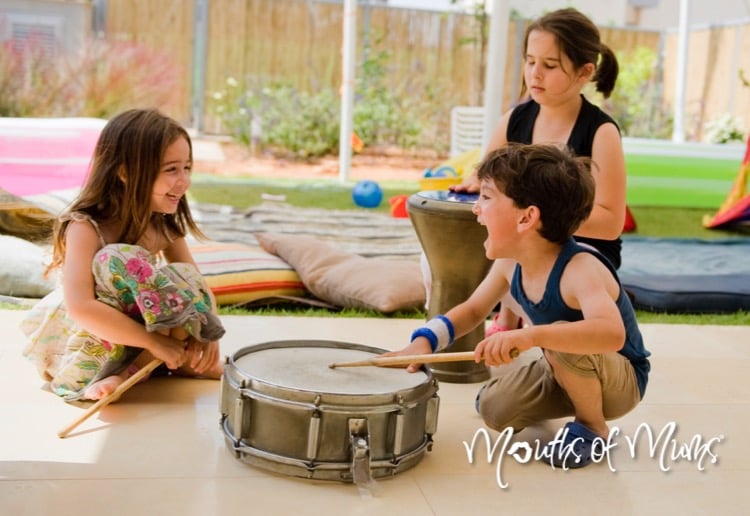Even the youngest children love sounds and music. Many preschools use music throughout the day to expose children to a wide variety of music.
In early childhood, music and music education can have many benefits that will serve children throughout their lives.
Music can promote motor skills
Depending on the age of the child, music can give children the opportunity to use both gross and fine motor skills. The youngest children may engage in large movement activities such as jumping and turning to music while older children may use fine motor skills to play an instrument. Either way, muscles are strengthened and connections are made with music being the key ingredient.
Music helps children learn language
Young children can learn about words through song lyrics, and they can significantly increase their vocabulary. Songs can teach them how words fit together in sentences as well. Many children enjoy singing songs with new words in them. One preschool teacher, for example, sings about the weather daily, teaching children the words overcast, precipitation, and temperature. Simple definitions are part of the song each day.
Music can boost memory
Children of all ages can remember things better when they sing. For example, a child who makes up a song about his morning routines is less likely to forget one part of that routine. They are great mind exercises. Additionally, songs can help keep an idea in a child’s mind. When listening to a particular piece of music while engaging in a routine task, the child will associate the music with the task, thus remembering what she is supposed to be doing. An example of this would be a child who always cleans up when she hears a particular Beethoven medley.
Music can be social
Children often engage in music in a social group. Kid’s music lessons or classes, children’s choirs, and bands all allow children to work together to create music. Older children will especially have to work together to make the music sound good while the younger set will simply engage in social behaviours while creating their music.
Music can advance academic skills
Music can teach and reinforce many academic school skills that children are learning concurrently. Simple skills like learning the alphabet through a song are achieved by the youngest children. Even some rudimentary maths skills can be learned through music at this age. Skills like patterns and counting are important elements in getting smart through music education. Older children, especially those who sing in a choir or learn to play an instrument, can learn more complex math skills like fractions and division while reading the music they are singing or playing.
Music teaches discipline
As children grow older and learn to play an instrument, they begin to learn the discipline that is involved. They must practice a certain number of minutes, and they must perfect certain parts of the music.
Learning to take the time in the first place is one skill as it involves organisation and desire. Perfecting the music they are practicing also takes discipline to work on the piece repetitively. This discipline can carry over into other domains of the child’s life.
There are so many benefits of music education to a child’s life. Children who are exposed to age appropriate music activities and education from infancy gain benefits in many other areas of their life. A general love of music can be the greatest perk of all.
Do your children love music? Please share in the comments below.





















8:22 pm
9:09 am
7:55 am
11:30 pm
10:44 pm
10:46 am
1:29 pm
2:25 pm
12:41 pm
10:31 pm
9:12 pm
11:27 pm
3:15 am
11:07 am
1:19 pm
11:53 pm
9:16 pm
8:27 pm
6:01 pm
3:55 pm
- 1
- 2
- »
Post a commentTo post a review/comment please join us or login so we can allocate your points.